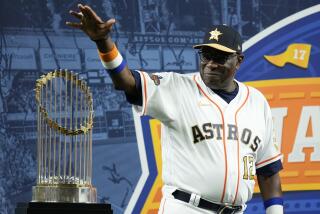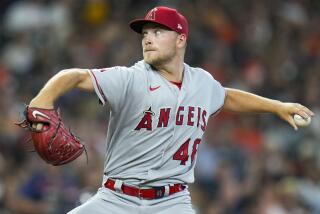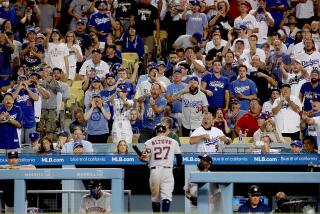His heart will stay on the field
- Share via
Doug McMasters keeps a framed photograph of nine former players on his desk at work. Dozens of others cover much of his bedroom wall. And he rents two storage units for his collection of Arcadia Astros hats, pants, jerseys and other gear.
“I can’t throw an Astros shirt away,” says McMasters, 46. “I think I bleed blue and orange.”
For 20 years, McMasters has coached the Astros, a summer baseball team for 15- to 19-year-olds. He has no children but jokes that he has hundreds — every young man who has ever worn an Astros jersey.
But with the passing of another summer, McMasters’ time on the field may be coming to a close sooner than expected. Next season, he says, may have to be his last.
****
By any measure, the Astros are top-notch. The team, whose members must be invited to join, was founded nearly four decades ago and, year after year, wins most of its games. Astros players have formed the core of nine San Gabriel Valley all-star teams that have won the Babe Ruth World Series in the 16- to 18-year-old bracket. Its alumni include several major leaguers and dozens of college and minor league players.
That’s just on paper. The real heart of the team — as on teams of its kind everywhere — is its volunteers. The Astros’ volunteer coaches are unusually dedicated and close-knit, half a dozen men with a comfortable, easy camaraderie and a shared love of baseball. Several, like McMasters, have been involved at least a decade and spend up to 30 hours a week at the field during the season.
The coaches emphasize fundamentals and teamwork — “old-fashioned baseball,” as one of them puts it. At an age when many players are becoming stars at their high schools, they underline their ethos by keeping names off the backs of the summer team shirts.
They weave in other lessons too. “We try to teach them little things about life, like shaking a person’s hand and looking them right in the eyes,” said Rick Cosbey, a longtime Astros assistant. “If they don’t do it, we tease them a little, but we try to keep the program very positive and always fun for them.”
The players respond. Years later, many men, some with more glamorous affiliations, speak of how proud they are to have been part of the Astros; several said they’d never had more fun playing ball.
“It’s kind of like a family,” said Chicago Cubs relief pitcher John Grabow, who played for the Astros in the mid-1990s. (When the Cubs play the Dodgers, he invites McMasters to sit with his parents.) “They teach these young guys to play the game the right way, to be on time and be responsible. And it’s such a great thing for their players because they’re always there for them.”
****
The coaches arrive early — to groom the field, mark the lines and hold batting practice before each game. They stay long after, chatting with players, offering advice. McMasters encourages anyone who’s ever been an Astro to call any time: He’ll meet them at the field.
McMasters went to Arcadia High School and the University of La Verne, playing catcher on his high school and college teams. In the summer, he played against the Astros but also accompanied friends to Astros practices. His first coaching stint was with another team. But in 1990, former Astros manager Jerry Florence recruited him to help out. And in 1994, when Florence bowed out after 14 years, McMasters took over.
Players say the coach, a burly man with a boyish face, is the glue that holds this fraternity together.
“He’s the greatest,” said Tim Smoley, 19, a Rio Hondo College player who spent five summers as an Astro. “He’s all about the kids.”
Adds P.J. Pilittere, another alum who now plays for a triple-A club affiliated with the New York Yankees: “From the first time you meet Doug, you know he’s a guy who absolutely cares.”
Baseball is a full-time passion for McMasters, but it is not his full-time job. He is the assistant superintendent of business services for the Los Nietos School District, keeping the books for the small, Whittier-based district. By coming in early, working late on non-game days and heading to the office some weekends, he makes time not only to manage the Astros but to run Arcadia High’s twice-weekly off-season baseball program each fall. He draws in many of the same volunteers to help out.
He also spends up to 15 hours a week on the road between his office, the field and his home. “Doug pretty much owns the freeway between Arcadia and Brea,” said Steve Proctor, another volunteer coach.
But he gives much more than time.
Several former coaches and parents support the Astros with small donations, and the Arcadia Elks chipped in $1,500 this year. But McMasters covers most of the team’s $10,000 annual budget himself. He has cashed in some of his retirement to help with its costs, including uniforms, equipment, an annual banquet and the generous snacks — candy, chips, sunflower seeds, beef jerky, sandwiches — he brings to each game.
“I buy more stuff than I need to, but the kids enjoy it. I feel very fortunate to be able to,” he said.
****
On a warm summer afternoon, rock music blared as men in their teens, 20s and 30s arrived at the Arcadia High field for the Astros’ alumni game, a good-natured annual barbecue and contest with the current team. Players’ families, now including wives and children, held mini-reunions in the stands as an announcer, another longtime volunteer, teased the visitors: “We’ve got 10 gallons of injury ice for you, ready to go.”
On the field, the alums, including college players, former minor leaguers, a high school coach and an umpire, greeted one another with back slaps and high-fives. But the warmest hugs went to the volunteers, especially McMasters.
Among those who watched, smiling, was Fred Peritore, the retired Arcadia history teacher who started the team in 1973 and led it for five years. He remains involved, attending many home games and sponsoring a couple of players each year.
“When I come to the field and people say, ‘This is the program you created,’ I can’t tell you how proud that makes me,” said Peritore, 70. “This is a great bunch of men, and with all the time they put in and the tremendous affection they give these kids, it’s just magnificent.”
****
McMasters loves the well-groomed field and the decades he’s spent on it, pacing the sidelines and shouting encouragement to his young players. But he can no longer see the field, or the game, as he once did.
For many years, his sight has been slowly deteriorating, the result of unusually early macular degeneration in both eyes. He’s now nearly blind in his right eye. And though he received some good news recently — he tried a new binocular-style device for his left eye and managed on his second try to pass his driving test and renew his license — his condition is getting worse.
Most of the players have no idea. But his assistants now quietly protect him from errant hits. He can no longer follow a hard-hit ball to the outfield or feel confident arguing a call with the umpires. And he knows that someday soon the long drive, often at night, between Arcadia and his home in Brea will be impossible.
McMasters hopes for one more season as the Astros manager. At the same time, to ensure the team’s future, he’s been recruiting and training younger coaches. Among them is Sean O’Leary, a 26-year-old former Astro and Cal State Los Angeles pitcher who McMasters hopes will one day take his place.
O’Leary speaks easily about what he’s learned from McMasters: the importance of choosing young men with character, not just talent; of pushing the players to be leaders, on and off the field, and encouraging them to learn from one another as well as their coaches. “The best thing about Doug,” he said, “he’s everybody’s fan.”
O’Leary doesn’t want to think about the Astros without the leadership of the man he calls his “baseball dad.”
“He’s built this whole team, and I just can’t see him going away,” the younger man said, his voice catching.
For now, McMasters remains immersed in Arcadia’s winter-ball program. It’s another season, with a new crop of players, and he’s still on the field. If the eyes get worse, or the extra effort becomes too difficult for him or for others, he’ll step down, he says.
Just not quite yet.
Trounson’s son played for the Astros in 2006 and 2007.
More to Read
Go beyond the scoreboard
Get the latest on L.A.'s teams in the daily Sports Report newsletter.
You may occasionally receive promotional content from the Los Angeles Times.










